Downtown Victoria Tour – Johnson Street
Johnson Street – 500 Block
The 500 block of Johnson Street is a one way street running west to east between Wharf Street / Store Street on the west and Government Street to the east.
Here are some of sights which are worth seeing in the 500 block of Johnson Street:
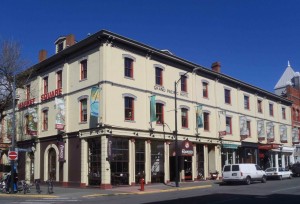
530-540 Johnson Street, built by Giacomo Bossi in 1879 with additions in 1883 and 1887.
530-540 Johnson Street / Store Street
530-540 Johnson Street was built in 1879 for Giacomo Bossi, who used as the Grand Pacific Hotel. Additions were made to the building in 1883 and 1887.
530-540 Johnson Street is listed on the Canadian Register of Historic Places as the Grand Pacific Hotel.
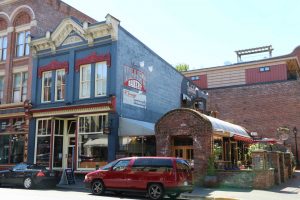
537 Johnson Street, Wille’s Bakery, originally built in 1887 by architect Elmer H. Fisher for Louis Wille.
537 Johnson Street was built in 1887 by architect Elmer Fisher for Louis Wille, who used it for his bakery.
537 Johnson Street is listed on the Canadian Register of Historic Places as Willie’s Bakery.
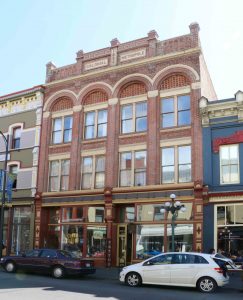
541-545 Johnson Street. Built in 1892 by architect John Teague as the Colonial Metropole Hotel. (photo by Victoria Online Sightseeing Tours)
541-545 Johnson Street was originally built in 1892 by architect John Teague as the Colonial Metropole Hotel.
it is listed on the Canadian Register of Historic Places as the Colonial Metropole Hotel.
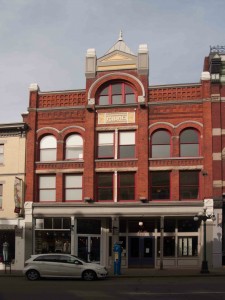
The Milne Building, 546-548 Johnson Street, built in 1891 for Alexander Roland Milne
546-548 Johnson Street – Milne Building
546-548 Johnson Street was built in 1891 by architect Thomas Hooper for Alexander Roland Milne.
It is listed on the Canadian Register of Historic Places as the Milne Block.
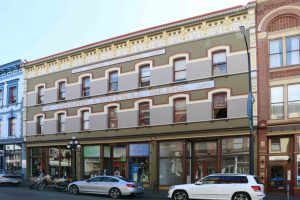
547-555 Johnson Street. Built in 1890 as the Colonial Hotel (photo by Victoria Online Sightseeing Tours)
547-555 Johnson Street was built in 1890 by architect Leonard B. Trimen as the Colonial Hotel.
It is listed on the Canadian Register of Historic Places as the Colonial Hotel.
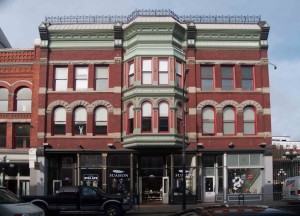
550-554 Johnson Street, built in 1893 for John Turner. In 1896 it was converted into the Strand Hotel by the B.C. Land & Investment Company
550-554 Johnson Street was built in 1892 as a commercial building by Victoria builder John Turner, who also built the Janion Hotel.
In 1896 the building was taken over by the B.C. Land & Investment Co. which converted it into the Strand Hotel.
It is listed on the Canadian Register of Historic Places as the Strand Hotel.
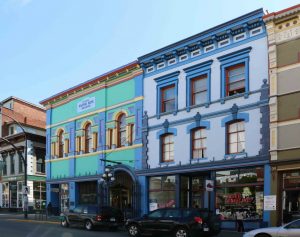
557-559 Johnson Street, built in 1875 with additions in 1886. (photo by Victoria Online Sightseeing Tours)
557-559 Johnson Street was built in 1875 with additions in 1886.
It is listed on the Canadian Register of Historic Places.
Market Square, 560 Johnson Street
Market Square, 560 Johnson Street, is a collection of historic buildings along Johnson Street, Store Street and Pandora Avenue, grouped around an inner courtyard which was originally a ravine running toward the Inner Harbour between Johnson Street and Pandora Avenue.
561-563 Johnson Street was built in 1890 by architect Leonard B. Trimen for Henry Saunders, who used it for his grocery and liquor business.
It is listed on the Canadian Register of Historic Places as the H. Saunders Grocery and Liquor Store.
It was later occupied by the Victoria Box & Paper Company, whose name still appears on the cornice.
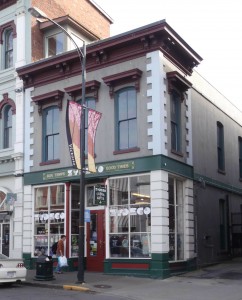
565 Johnson Street, originally built in 1879 (photo by Victoria Online Sightseeing Tours)
565 Johnson Street was built in 1879 for Elijah Howe Anderson, who also built the adjacent building at 567-569 Johnson Street.
565 Johnson Street is listed on the Canadian Register of Historic Places.
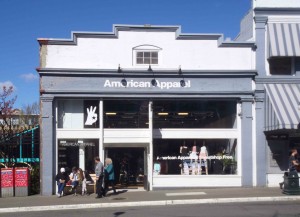
568 Johnson Street, originally built in 1904 as the Grand Theatre. It became part of the Pantages Theatre vaudeville circuit.
Originally built in 1904 as the Grand Theater. It was operated as part of the Pantages Theater chain until 1914, when the Pantages Theater moved to what is now the McPherson Playhouse.
It has been a commercial and retail building since 1914.
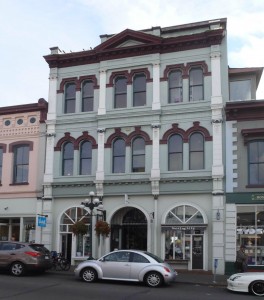
567-569 Johnson Street. Built in 1890. (photo by Victoria Online Sightseeing Tours)
567-569 Johnson Street was built in 1890 for Elijah Howe Anderson, who also built the adjacent building at 565 Johnson Street.
567-569 Johnson Street is listed on the Canadian Register of Historic Places.
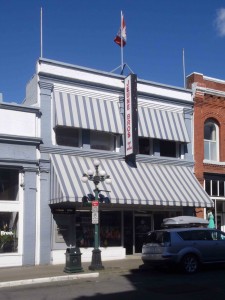
570 Johnson Street, built in 1905 by architects Thomas Hooper and C. Elwood Watkins for Jeune Brothers, which still occupies the building.
570 Johnson Street was built in 1905 by architects Thomas Hooper and C. Elwood Watkins for Jeune Brothers, which still occupied the building.
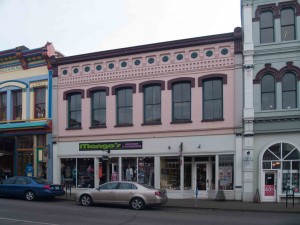
571-577 Johnson Street, built in 1899 for F.E. Newberger. Attributed to architect John Teague.
571-577 Johnson Street was built in 1899 for F.E. Newberger, who used it for his gunsmith business.
It is listed on the Canadian Register of Historic Places.
The design of this building has been attributed to architect John Teague although this cannot be stated with certainty.
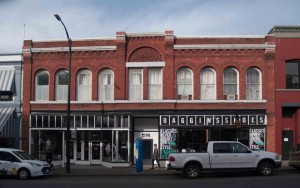
574-580 Johnson Street, built in 1899 by architect Thomas Hooper for D.E. Campbell and A.G. McCandless
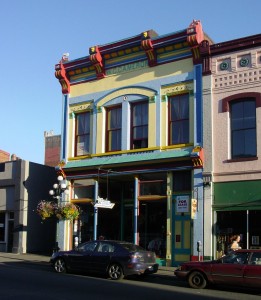
579-581 Johnson Street, built in 1888 for W.G. Cameron by architects Elmer Fisher and William Ridgway Wilson (photo by Victoria Online Sightseeing Tours Inc)
579-581 Johnson Street was built in 1888 by architects Elmer Fisher and William Ridgway Wilson for W.G. Cameron, a clothier who moved to Victoria from California.
579-581 Johnson Street is listed on the Canadian Register of Historic Places as the W.G. Cameron Building.
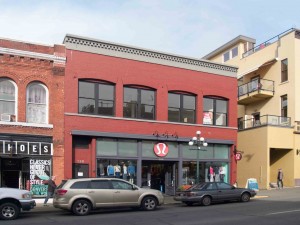
582-586 Johnson Street, built in 1908 for the Vancouver & Prince Rupert Meat Company.
582-586 Johnson Street was built in 1908 for the Vancouver & Prince George Meat Company.
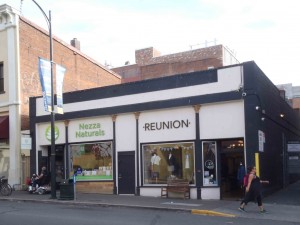
585-587 Johnson Street, originally a two storey building, built in 1877 by architect John Teague for Thomas Shotbolt and his Shotbolt’s Drug Store
585-587 Johnson Street was built in 1877 by architect John Teague for Thomas Shotbolt (1842-1922), who used it as a drug store.
It was originally a two storey building but, for some reason, the second floor was removed in the 1950’s.
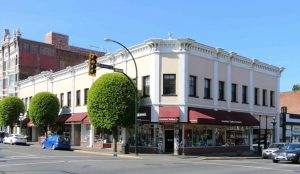
The Russell Block, 1316-1328 Government Street and 589 Johnson Street. Built in 1878 and 1888 by architect John Teague for R.J. Russell (photo by Victoria Online Sightseeing Tours)
589 Johnson Street / 1316-1328 Government Street
589 Johnson Street / 1316-1328 Government Street was built in 1878, with additions in 1888, by architect John Teague for R.J. Russell.
It is listed on the Canadian Register of Historic Places.
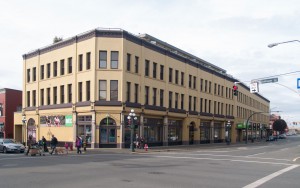
1400-1450 Government Street, built in 1892 by architect Thomas Hooper as the Victoria Hotel. (photo: Victoria Online Sightseeing Tours)
1450 Government Street was built in 1892 by architect Thomas Hooper as the Victoria Hotel.
It is listed on the Canadian Register of Historic Places as the Victoria Hotel.
Government Street intersects
Government Street – 1300 Block (Johnson Street to Yates Street) / Government Street – 1400 Block (Johnson Street to Pandora Avenue)
Johnson Street – 600 Block
The 600 Block of Johnson Street is a one way street running west to east between Government Street on the west and Douglas Street on the east. Broad Street also intersects Johnson Street at the mid point of the 600 Block of Johnson Street.
Here is a Google Street View image of the 600 block of Johnson Street at Broad Street:
Here are some sights with are worth seeing in the 600 Block of Johnson Street:
Johnson Street – 500 Block continues west
Government Street intersects
Government Street – 1300 Block / Government Street – 1400 Block
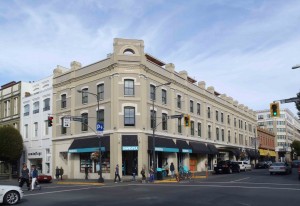
The E.G. Prior Building, 1401 Government Street & 606-614 Johnson Street, built in 1888 for the E.G. Prior & Co. hardware store. (photo by Victoria Online Sightseeing Tours)
606-614 Johnson Street / 1401 Government Street – E.G. Prior Building
606-614 Johnson Street / 1401 Government Street was built in 1888 as a hardware store for E.G. Prior & Co.
It is listed on the Canadian Register of Historic Places as the Prior Building.
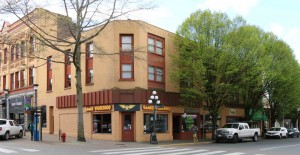
615-625 Johnson Street, originally built in 1874 by Simeon Duck as the Canada Hotel
615-625 Johnson Street was originally built in 1874 by Simeon Duck, who ran it as the Canada Hotel. In 1892 Simeon Duck also built the adjacent Duck’s Building, 1314-1322 Broad Street.
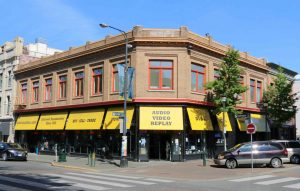
618-624 Johnson Street/1400-1402 Broad Street, built in 1909 by architects Thomas Hooper and C. Elwood Watkins for Lee Cheong, Lee Woy and Lee Yan Yow.
618-624 Johnson Street / 1400-1402 Broad Street
618-624 Johnson Street was built in 1909 by architects Thomas Hooper and C. Elwood Watkins for Lee Cheong, Lee Woy and Lee Yan Yow, who also built the Lee Block, 1618-1628 Government Street.
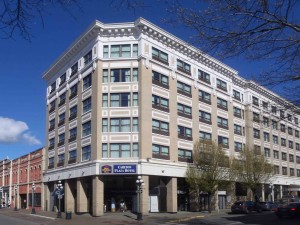
The Carlton Plaza Hotel, 642 Johnson Street at Broad Street
642 Johnson Street – Carlton Plaza Hotel
A major addition was completed on the west side of the building (at Broad Street) in 1981.
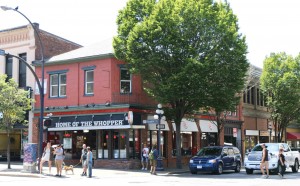
1328 Douglas Street, built in 1878 as a grocery store for Thomas Nicholson
1328 Douglas Street, on the southwest corner of Johnson Street and Douglas Street, was built in 1878 as a grocery store for Thomas Nicholson.
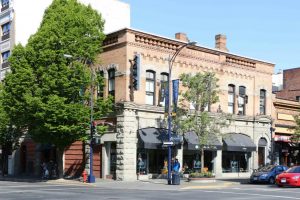
The Porter Block, 1402-1406 Douglas Street. Built in 1900 by architect William Ridgway Wilson for Robert J. Porter, who used the main floor for his butcher shop, R. Porter & Sons.
1402-1406 Douglas Street – the Porter Block
The Porter Block, 1402-1406 Douglas Street, at the north west corner of Johnson Street and Douglas Street, was built in 1900 by architect William Ridgway Wilson for Robert J. Porter, who used the main floor for his butcher shop, R. Porter & Sons.
It is listed on the Canadian Register of Historic Places as the Porter Block.
Johnson Street – 600 Block continues west
Douglas Street intersects
Douglas Street – 1300 Block / Douglas Street – 1400 Block
Johnson Street – 700 Block continues
Johnson Street – 700 Block
The 700 Block of Johnson Street is a one way street running west to east between Douglas Street on the west and Blanshard Street on the east.
Here is a map showing the location of the 700 Block of Johnson Street:
Here is a Google Street View image of the 700 Block of Johnson Street:
Here are some notable sights in the 700 Block of Johnson Street:
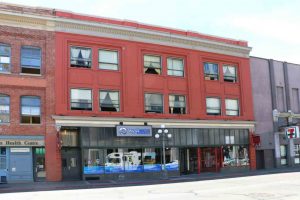
The Scott Building, 705-711 Johnson Street. Built in 1912 for Robert Scott by architect Leonard W. Hargreaves.
705-711 Johnson Street – the Scott Building
The Scott Building at 705-711 Johnson Street was built in 1912 by architect Leonard W. Hargreaves for Robert Scott.
It is listed on the Canadian Register of Historic Places.
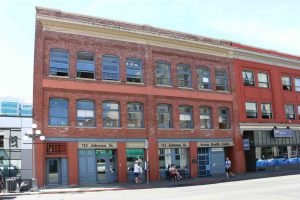
713-715 Johnson Street, built in 1908 for Mable Carriage Works by architects Thomas Hooper and C. Elwood Watkins
713-715 Johnson Street – Mable Carriage Works Building
713-713 Johnson Street was built in 1908 by architects Thomas Hooper and C. Elwood Watkins for William J. Mable, who used it for his Mable Carriage Works business.
This building is listed on the Canadian Register of Historic Places as the Mable Carriage Works. Remnants of the Mable Carriage Works sign can still be seen on the east wall of the building.
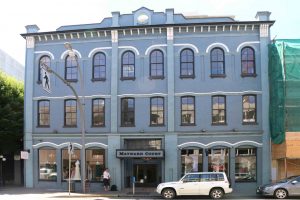
731-733 Johnson Street (photo: Victoria Online Sightseeing Tours)
Now known as Maynard Court, 731-733 Johnson Street was originally for William Grimm as a factory for his Grimm’s Carriage Works.
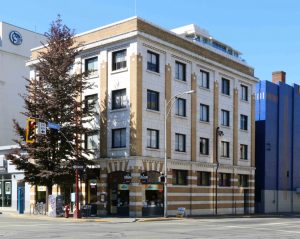
1320-1324 Blanshard Street, originally built in 1912 by architect Thomas Hooper for Max Leiser, who used it for his Kaiserhof Hotel.
1320-1324 Blanshard Street was built in 1913 by architect Thomas Hooper for Max Leiser, who used it as the Kaiserhof Hotel.
It is listed on the Canadian Register of Historic Places as the Kaiserhof Hotel.
Blanshard Street intersects
Johnson Street – 800 Block continues east
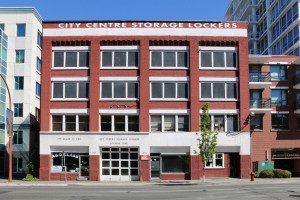
818 Johnson Street, built in 1911 as the Caldwell & Cameron livery stable. (photo: Victoria Online Sightseeing Tours)
818 Johnson Street was originally built in 1911 as a livery stable for the Caldwell and Cameron company.
It is now used by a storage company.
Would you like to leave a comment or question about anything on this page?
Error: Contact form not found.

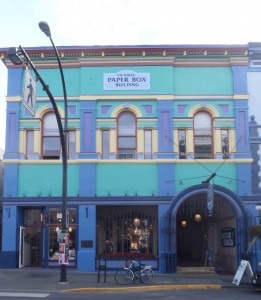
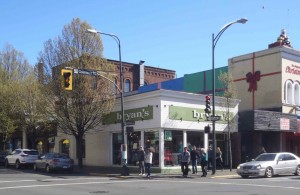
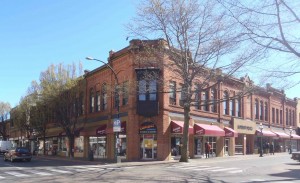
Get Social